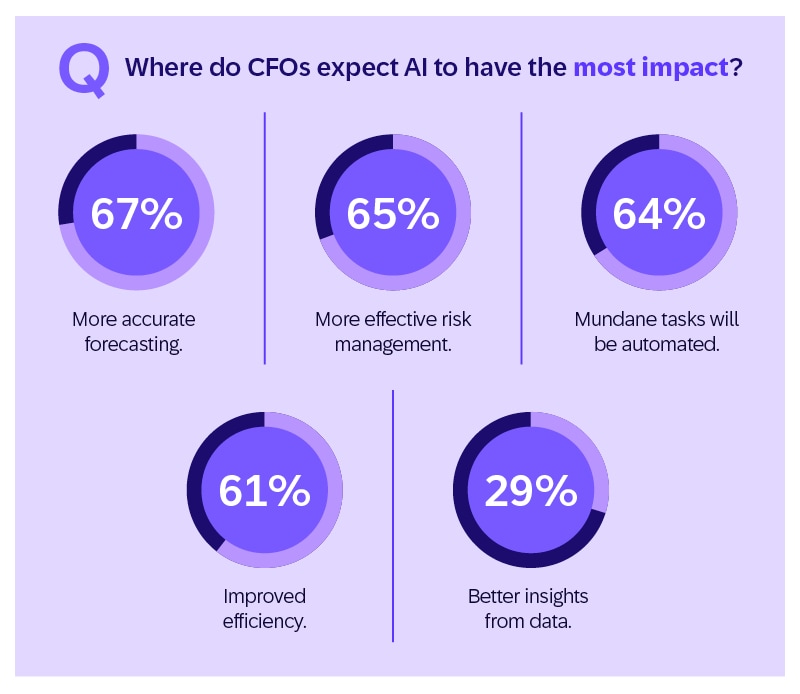Employee Experience
How does AI optimise and future proof your T&E spend management?
The recent surge in generative AI (GenAI) has created excitement, sparked discussions and inspired innovative thinking about the potential of AI to transform business. As we deepen our knowledge of AI’s capabilities, now is the time to explore the specific advantages that it can offer finance teams.
There are definite gaps in education, with 58% of finance leaders saying they understand very little about AI. Despite this lack of confidence, interest and acceptance of AI is on the rise, with 51% of CFOs saying they are investing in it, compared to 15% in 2023.
Despite growing awareness and excitement about the potential impacts of AI on business spend management, finance leaders still face significant challenges when it comes to the rapid advancement of the technology. How do you get your finance teams on board with change? How do you measure return on investment (ROI) and ensure AI initiatives align with your organisation’s business goals?

At SAP Concur, we’ve embedded AI and machine learning (ML) into our solutions for over a decade and we have a deep understanding of the powerful benefits, including improved forecasting, enhanced decision-making and greater efficiency.
In this blog, we’ll uncover the true value of AI and ML in supporting CFOs and helping them lead their business to success.
Contents
A new era of AI and spend management
What are the AI-adoption challenges that finance leaders face?
AI is a game changer and we're already ahead of that game
A new era of AI and spend management
Initial fears that AI might lead to robots replacing humans in their roles are giving way to an appreciation for how AI can eliminate some of the time-consuming, mundane and routine tasks that make us feel robotic during the working day.
Caution about AI is definitely subsiding, with 67% of CFOs saying they believe AI threatens their teams and 27% saying they believe it threatens their own position, down from 90% and 68% respectively in 2023.
Moving beyond acceptance, CFOs are also beginning to get a clearer picture of how AI helps them reach more powerful data financial insights, to support rapid, accurate data-driven decision making. This enables finance teams to turn their attention to more strategic tasks that require the human touch – which for many tasks can never be replaced.
For over a decade, SAP Concur has been delivering spend management solutions based on AI models that are highly trained with vast amounts of past data. Now, by leveraging GenAI and by infusing AI earlier in the spending cycle, we can improve compliance while providing customers with exceptional user experiences and move even closer to our vision of a world where travel and expenses (T&E) practically manage themselves.
To learn more about how AI is transforming the T&E landscape and how SAP Concur is at the forefront of this evolution, read our eBook Think you know AI? Think Again.
What are the AI-adoption challenges that finance leaders face?
Despite increased understanding and acceptance of AI in everyday finance tasks, there remains several question marks around how to best implement AI and the role it will play in finance teams moving forward.
Let’s look at four of the key questions finance leaders are asking:
- Is the data safe and can we maintain compliance?
AI and ML require vast amounts of data to be effective. This can lead to concerns about data security and control over data. The use of AI in finance raises ethical questions, such as bias in algorithms and transparency in decision-making. CFOs need to consider how to implement AI responsibly and maintain trust with stakeholders.
There’s also the issue of maintaining compliance with current and future regulations. There are ways to understand and calculate all these factors, but it requires extensive skills and experience.
One solution is to partner with a solutions provider such as SAP Concur, which has deep expertise in the AI and compliance space. On an ethical level, SAP was the first European technology company to release AI ethics guiding principles and to form an outside ethics advisory panel.
“As companies accelerate their adoption of AI technology, it is crucial to commit to ethical practices and self-regulation until comprehensive international AI regulations are put into place. By doing so, we can ensure a safer, fairer, and more responsible AI-driven future for all,” says Christian Klein, CEO & member of the executive board of SAP.
- How do we close the skills gap?
There’s a shortage of skilled professionals in AI and ML, making it difficult for finance teams to find and retain the necessary talent. CFOs need to decide when and how to train existing staff and when to invest in new experts, training and user experience initiatives.
But there’s a positive flipside too.
Finance leaders are beginning to understand how AI tools can alleviate staff shortages by enhancing automation and efficiency, while also enriching finance roles to make them more engaging and appealing to younger candidates.
When asked, CFOs said they believed that AI can make the most difference to bookkeeping, (65%), financial planning (59%) and risk scenario planning (53%). By freeing finance teams of some of the burden of these tasks, they can focus on strategic endeavours and more engaging tasks, which supports talent retention.
Louise Williams, Group Finance Director at wealth management firm Quilter, says, “Technology has automated many manual processes that once defined our work, freeing accountants to engage in complex problem-solving and critical thinking. This shift allows accountants to play a pivotal role in strategic decision-making, leveraging their expertise to drive business success in an increasingly data-driven world.”
To discover more about closing the talent gap, read our Mind the gap: How to attract the next generation of finance talent eBook.
- How do we manage change?
Implementing AI solutions can involve changes to workflows and processes. CFOs must manage the cultural shift within their organisations, addressing resistance and getting employees on side.
Most roles you can think of will benefit from AI. For financial decision-makers, there are gains to be had in cost cutting and compliance. Travel managers will benefit from autogenerated cost estimates, improved visibility into travel policies and personalised booking services. Accounts payable teams will see invoice processing accelerate at scale, while IT decision-makers can use AI to enhance data security. Meanwhile, Chief Human Resource Officers and HR leaders will benefit from a more dynamic, engaged workforce, as mundane tasks become a thing of the past.
Once you’ve explained the benefits of AI to each role, you need to focus on getting everyone up to speed – 34% of travel managers believe their potential for success is being limited by their company’s expectation to adopt AI powered tools without training. It’s important to roll out a training program to build confidence.
In addition to training opportunities, finance leaders can partner with IT to improve users’ experience of the technology. By collaborating with CIOs on AI to boost efficiencies, CFOs will ensure integrated deployment of AI projects across the organisation with minimal disruption and cost overrun.
- How do we ensure strategic alignment?
So that AI initiatives align with the overall business strategy, finance leaders are advised to identify specific problems that AI can solve and prioritise projects that deliver the most return on investment (ROI) all while managing risk.
CEOs require finance leaders to deliver swift and precise assessments of the value derived from AI investments. Some studies report substantial ROI from AI initiatives, while others describe the returns as lacklustre. Given that many AI tools are relatively new, there is a lack of frameworks for successful implementation and at many organisations, projects remain in the planning or experimental stages.
ROI measurement for AI projects is a combination of art and science, according to Guy Melamed, CFO & COO of software security provider Varonis.
“We stick to clearly measurable productivity gains, such as lines of code, journal entries or expense reimbursement checks completed by AI,” Melamed says. “This has led us to emphasise AI projects that reduce tedious tasks, help employees use their time better, and gain job satisfaction and engagement. It doesn’t necessarily need to create a large cost saving, just be at least cost neutral.”
Measuring ROI on AI goes beyond traditional financial metrics, incorporating factors like quality improvement, innovation and brand reputation. According to Deloitte, you should quickly roll out successful experiments more widely — using cloud platforms where possible — to justify the large investments
needed for AI. But overall, CFOs should understand that long-term investment in the right data practices, technologies, talent and business processes will be worth the cost.
Partnering with an experienced provider whose AI benefits are built-in can bring more certainty and rapid results. With our deep knowledge and expertise in AI in T&E spend management, SAP Concur can help you overcome all these challenges, allowing you to balance embracing innovation with managing risk.
For further guidance on putting the pieces of the ROI puzzle together, read our Solving the ROI puzzle: How to measure and maximise AI returns eBook.
AI is a game changer and we’re already ahead of that game
There is no doubt that AI is changing the T&E landscape. The clouds of doubt and fear have cleared and businesses are left with a deeper understanding of what exciting possibilities lie ahead.
SAP Concur is a reliable steward of spend data, processing 22 million expense reports and travel bookings each month. With our solutions, you can harness vast amounts of T&E data to control costs, manage taxes, ensure compliance, mitigate risks and audit expenses – all while trusting that your data is secure.
We are dedicated to tackling concerns related to ethics, security, copyright and bias. Our commitment to our customers and data privacy is steadfast, and we aim to deliver AI experiences that not only meet our customers' business goals but are also used responsibly.
We take on the challenge of integrating AI capabilities into our solutions so you can focus on elevating your business without any concerns. It's all built in, enabling you to reach new heights.
To learn more about our future-proofed spend management solutions, visit our website.
